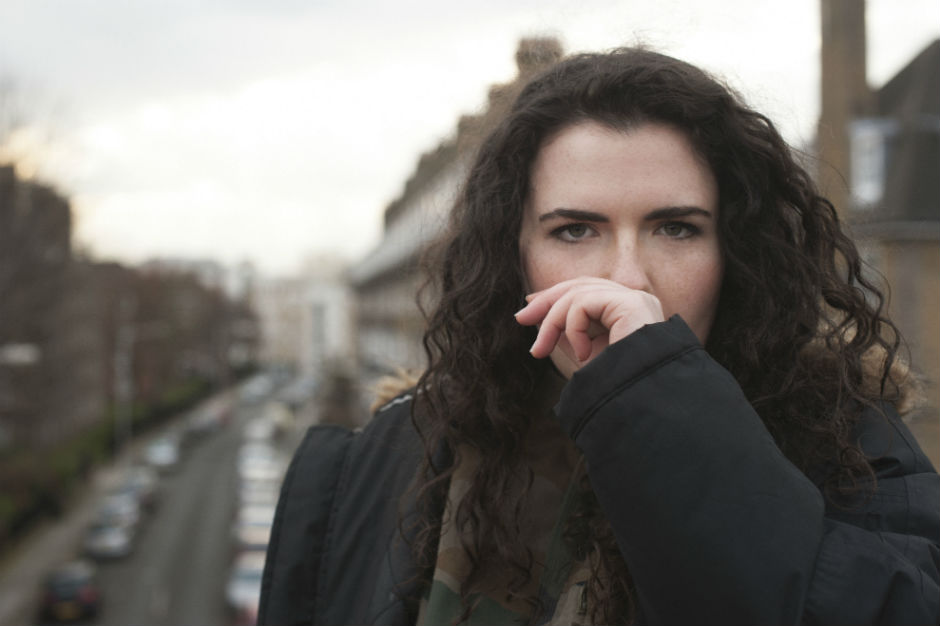The audience for Georgia’s headlining performance at Baby’s All Right in Williamsburg, Brooklyn is hard to pin down. There’s a lanky tall guy in the center of the room, who, with his salt-and-pepper hair and tight blue turtleneck, looks like a Kraftwerk alternate. A woman in the back wears a striped black-and-white dress that, from one angle, evokes Jean-Luc Godard; from another, Tim Burton. The two girls texting to the side would fit in at a Taylor Swift concert. The whole peculiar scene looks like parents’ night at the coolest high school ever: Preppy dads and post-punk dads, hipster moms and hip-hop moms, all brought together in one crowded back-room auditorium. Something in Georgia’s arrival has convinced the borough’s bohemian tribes to get along.
Her eponymous debut LP, released early this August through Domino Records, is a boiling 40-minute head-bop, written, performed, and produced by the newly liberated musical talent. The intro track alone, with its lofty electro-choir and children’s shouts, radiates with anxious excitement. The true opener, “Kombine,” delivers on the pent-up angst, mixing up and down pitched vocal ticks, synth drones, and a Pakistani qawwali-esque vocal sample. It’s a captivating sonic collage — one that engages familiar sounds without bowing to any particular music tradition.
“I’m a big fan of music, really,” explains the 25-year-old Londoner, seated at a table in a Williamsburg bar a few hours before she is set to perform. “I feel like this album is just a bit of take from there, take from there, take from there. I’m trying to create my own type of thing.”
Georgia Barnes grew up in north London during the nineties, when dubstep was a prime U.K. export. As a teen, Georgia started going clubbing with friends – exploring the music scene and, in the process, nursing a rebellious core. “I’m kind of a city girl,” she says, “I love the struggle. I love the smoke. I love the industrial-ness. I love the fight.”
Neil Barnes, half of the influential electronic duo Leftfield, is her father, who would sometimes bring her along to watch him work. As Georgia puts it, “I grew up in studios.” She also began playing music for herself, picking up guitar, piano, various African instruments — and, of course, the drums: the vessel for Georgia’s childhood exuberance. “I was kind of an energetic kid,” she says, “I needed something to channel that in.” At the age of 19, she began drumming professionally, and over the years she has worked with numerous acts, including fellow Londoners Kwes and Kate Tempest.
The remnants of a musical upbringing are all over Georgia. “Move Systems” begins as a sort of Muzak-fusion, before launching into an ominous rebel yell, complete with dark synths and manic drums. Influence for this track spans from Brazilian hip-hop acts to ‘80s South Bronx outfit Boogie Down Productions. “My dad was the first one to play me [a Boogie Down Productions] record,” Georgia recounts, “and I’ve never stopped listening to it, because the production is so amazing – the kind of minimal drums. They’ve changed the face of hip-hop.” And where did the huff-and-puff mantra of “Move Systems” come from? According to Georgia: the chorus to Ludacris’ “Move Bitch.” Go figure.
Luda’s distinguished oeuvre notwithstanding, his protegé calls Missy Elliott her main influence, especially her 1997 debut LP Supa Dupa Fly. While Misdemeanor laid down the bars, it was Timbaland’s work on the album that showed Georgia what it meant to be a producer. “His production is just amazing,” she gushes. “I mean, you listen to these albums anywhere. That was always the thing. On a car stereo, on your phone, on a good sound system. It sounds great wherever you play it. And that, for me, is the main goal when you’re a producer. You want it to sound good everywhere.”
To ensure that her music translates well onto the stage, Georgia employs a somewhat unusual live set-up: two drum sets (one of which she occupies), top- and bass-line keyboards, and guitars. The arrangement hits hard, dismantling into delightful chaos when the low-end rumbles and the dueling drums kick in. The set-up, according to Georgia, was “a natural move to make, as opposed to a DJ… I want it to be a kind of real experience when you see the live show, sonically.”
Back at Baby’s, Georgia and her band are midway through “Nothing Solutions” and, after standing briefly to sing some bars at the center-stage mic, she sits back down and returns to punishing her drum-set. A guitar stands against an amp, and she plays that too, once the drums have had enough. The Kraftwerk guy is clearly into it, as are the Burton beau and the Taylor twins. Georgia has won over the crowd, but for her that’s good enough: “I think that I’d love to build up a kind of character to my production,” Georgia muses, “Or if I work with someone else for people to go, ‘Oh, they’ve worked with Georgia.’ That would be a real achievement.”





